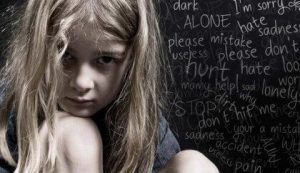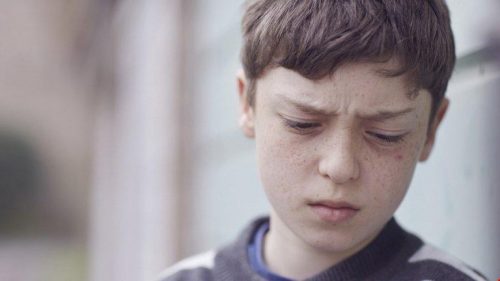Verbal Abuse in Childhood Leaves its Mark

Verbal abuse in childhood directly affects children’s health. Nevertheless, we’re not aware of all of its effects. This is because we sometimes confuse it with the use of bad words. But it goes much further than that.
Verbal abuse in childhood is a direct attack on the self-worth of the victim. In this case, it’s an attack on children. Aside from that, abuse through words also means abuse at the psychological level. In fact, the National Child Traumatic Stress Network (NCTSN) has some data on this. According to them, psychological abuse is the most common type of violence.
It’s very important for us parents to be careful of what we say to our children. That’s why we should control our way of speaking to them. We should be especially careful when pointing out their mistakes to them.
Why does verbal abuse leave its mark in childhood?
There’s a reason why verbal abuse in childhood leaves an important mark. It’s because childhood is a very critical development stage. The nervous system and the brain are very vulnerable to any stimulus from the environment. Thus, everything that happens on the outside influences the child in one way or another.
Also, according to J. Pinel, the process of neurodevelopment takes place from conception to the fetal period. It then continues into the postnatal period. It doesn’t stop until adulthood. That being the case, it’s normal for children to be susceptible to neuropsychological damage during childhood.

A publication called Review of the Neuropsychology of Childhood Abuse: Neurobiology and the Neuropsychological Profile of Abuse Victims During Childhood has relevant information.
It states that verbal abuse in childhood can cause attention and memory problems and difficulties with language and intellectual development. It can lead to scholastic failure.
“Brain alterations of a functional and structural type seem to explain future neuropsychological functions of childhood abuse victims.”
-Neuropsychology of Child Maltreatment and Implications for School Psychologists, A.S. Davis, L.E. Moss, M. Nogin, N. Webb-
Now then, in what ways do we hide it so that we call it by other names? Sometimes, we justify it by calling it “teaching” or “raising” the child as best we can.
Punishment is to blame
Many parents don’t know how to raise their child in any other way than by focusing on the bad. On the other hand, when the child does something good, it’s not mentioned. This is because they think that’s how it should be. If a child brings it up, the parent tends to just say: “That’s what you should be doing.”
Nevertheless, in this delicate stage, focusing only on negative aspects has serious consequences. In fact, most of the time, the parents don’t just tell the child what they did wrong. They also make them feel guilty for having angered their parents. To this, we can add the poor choice of words when conveying these messages to children.
Comparing one child to another or saying “You’re dumb” may seem innocent. It might also be justified as the parent feeling so annoyed that they lost their cool. However, all of this can leave a permanent mark on the mind of any child. This is especially true when it happens frequently.
For example, let’s say your child tries to solve a math problem and you call them “dumb” for not doing it right the first time. At the same time, you highlight that their friends always do it right. In this case, the child can consider themselves to be bad at math. Aside from this, they will believe they’re a worse student than their friend.
Immediately, they will believe they can’t do anything about it. This will make them reject math in the future. They may also feel a certain fear of failure. At the smallest failed attempt in any field, they will give up because they consider themselves to be “incapable“.

What kind of self-image do we expect the child to develop with this type of behavior? Let’s not forget that, during childhood, they’re building their identity. This identity can be plagued with “I’m not worth anything”.
It can include “It’s my fault my parents are angry”. Or also “I can’t do anything right” or “I’m dumb”. The child could think “I deserve the worst”. All of this will hinder the creation of a solid self-esteem.
“…which are harmful acts, especially verbal ones, constantly telling the child that they are odious, ugly, stupid. Or make them seem like an undesirable burden. They might not even be called by their name. Rather, they might call them “You”, “Idiot”, or some other insulting thing”.
–Abused Children, Kempe and Kempe (1979)-
As we can see, verbal abuse in childhood affects children. It does so in significant ways. We must also mention that parents are often unaware of what they project onto their children.
They may project their frustrations at work, high levels of stress, relationship issues, or the oppressiveness of their responsibilities. They project this onto their children through their language. You should keep this in mind if you want your children to be happy.
It’s important to be able to adequately manage our emotions. We should also empathize with our children and, above all, learn to communicate positively with them. We should always take their self-esteem into account.
After all, we wouldn’t want to make them into timid, sad adults. Adults who believe they’re unable to do things and who, in the long term, will set limits for themselves.
This text is provided for informational purposes only and does not replace consultation with a professional. If in doubt, consult your specialist.








